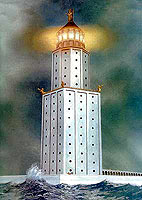
Alexander the Great founded Alexandria in 331 BCE. Capital of Egypt for a
millennium, up until the Arab conquest (641 CE), Alexandria was a cultural and
commercial centre of the ancient world.
Very recently, UNESCO announced the establishment of an international scientific
advisory committee to help establish the foundations for a subaquatic museum in
the Bay of Alexandria, Egypt, where archeological remains of exceptional
interest can be found, including those of Cleopatra’s palace and the famous
lighthouse of Alexandria. Preparatory work by this committee is expected to
begin by November 2008.
According to the preliminary plans, the museum will be built partly above and
partly below sea level. The submerged part of the complex will enable visitors
to discover, in a unique way, the archeological remains resting on the seabed.
This is an important innovation in showcasing subaquatic cultural heritage.
“Conquer fear, and I promise you, you will conquer death,” said Alexander the
Great. Alexandria was, during its time, one of the greatest cultural centres of
the Mediterranean and survives today, through the exceptional efforts of
archeologists, as a testament to the creativity and aspirations of humanity.
Cultures traverse time and are steps on the path of evolution. They tell us
where we come from, where we are and where we are going.
Without culture, there is no civilization, no history, no memory; neither is
there vision or a future. With a loss of culture come an uprooting, a
dehumanization and the tyranny of fear.
A people that loses its ability to create, develop and enrich its culture is a
people doomed to disappear. All traditional societies understood this, which is
why they always placed culture at the heart of their development.